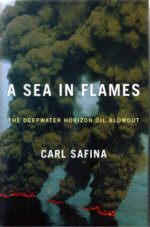  A Sea In Flames
A Sea In Flames
Carl Safina
Crown, 368pp, HC, $25
Early in the morning of April 20, 2010 I was at my desk on Dauphin Island, Alabama, about to read my email when the telephone rang. A neighbor asked if I had heard that an oil rig in the gulf had caught fire and gave me a URL for the coverage. The video was terrifying--a "war of the worlds" scenario and that was just the beginning of a many months' long siege of destruction and deception by the corporations responsible; worry, anger, frustration and mourning for the human population of the Gulf coast. The sea and wild life will likely never recover (don't you believe them).
Carl Safina's book about the Deepwater Horizon oil blowout is riveting, not only because of the subject...a disaster of mammoth proportions, but because, for most of the book, he expresses an outrage that reflects the feelings of the majority of gulf coast residents and sympathizers everywhere. He rails at BP and at the federal government for the lack of preparedness and the precautions not taken; for the cavalier attitude toward life and death of people and critters; for the lies, the smug condescension and "crocodile" concern of the Big People for the "small people."
The emotional intensity of his reporting mirrored my personal reaction to the real events and the attempts at mollification visited on the coastal residents by corporate perpetrators (and their "minions.")
As he reports, he plays an alphabet game: U.S. regulators are Being Played; "a light ribbony slick gift wraps the shoreline"...the Big Present. BP "money flows like oil." The BP managers know how to keep people Busy and Paid. The locals know they are Being Pacified, that the busy work is theater. (I volunteered but the only action I could find was a "beach clean-up" job at $17 an hour. I got a hard hat, steel toed sneakers and a hazmat certificate (for taking a one week course). I sat under a tent ten hours a day splicing nylon three ply for boom anchors.
As for the booms, Safina agrees with the local observation; they were/are useless. "You might as well stretch dental floss across your bath tub to hold soapy water on one side." Frequently, fellow pleasure boaters and I go out and inspect the boom installation. More often than not we observed them washed up, tangled up or completely deflated...of way too small a diameter to deter the most demure wavelet...and there were miles and miles of it all over the gulf.
And then there were the dispersants. It is estimated (by Dr. Jane Lubchenco, former oceanographer and current NOAA administrator) that "1.25 million barrels of neutrally buoyant chemically and physically dispersed oil ended up drifting in the water at depths between thirteen hundred to forty-three hundred feet...and that's not good. I mean oil is inherently really toxic...we really won’t know for decades...but it's likely it’s had very serious impacts."
On July 14, it is announced that 5 million barrels (200 million gallons) have escaped making Deepwater Horizon the world's "largest accidental release". (Does that statement make you consider what might have been released on purpose?)
Finally, on August 5, they stop the flow and on September 19 it is announced that America's worst oil leak is "effectively dead."
From the facts and figures to interviews with major players, major victims and lots of local people watching with bated breath, Safina found respondents that bring the real life experience alive, and the corporate malfeasance to the light. He writes with heat and clarity.
But the conclusion of the book a letdown. Rather than dig deep for solutions and preventative action from his knowledgeable collection of respondents, his tone changes to apologetic as if he just realized that for most of the book he was speaking truth to power. Safina makes nice to all the government folks he interviewed, in essence saying they did the best they could under the circumstances and spreads the blame around.
"The blowout is both an acute tragedy and a broad metaphor for a country operating sloppily, waving away risks and warnings, a country that does not use care in stewarding its precious gifts, a country concerned only about the next little while, not the longer time frames of our lives or our children's future."
The book starts out as a fiery condemnation, an, "I'm mad as hell, and I'm not going to take it anymore" moment and turns into a miasma of platitudes about our "precious gifts". He ignores the obvious. A country run by corporations cannot police itself.
|